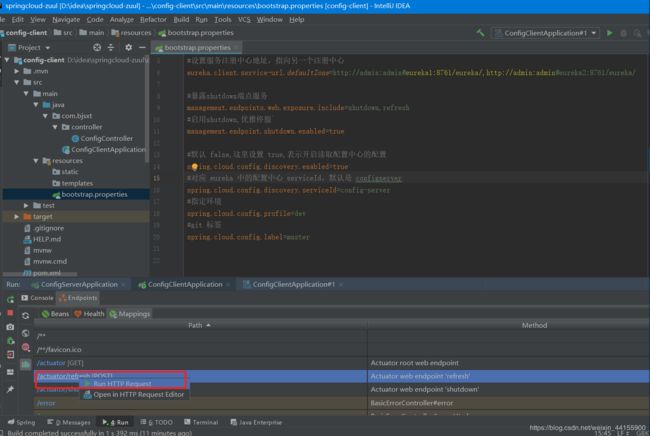springcloud config在Git端修改配置后,在不重启服务中如何让客户端生效
springcloud config在Git端修改配置后,在不重启服务中如何让客户端生效
1、使用git后,由于需要加载git中的配置文件,所以客户端的配置文件需要更换为bootstrap.properties。

2、在客户端的pom文件中添加actuator的依赖jar包,实现刷新的必要依赖
<dependency>
<groupId>org.springframework.cloud</groupId>
<artifactId>spring-cloud-starter-netflix-eureka-server</artifactId>
</dependency>
或者
<dependency>
<groupId>org.springframework.boot</groupId>
<artifactId>spring-boot-starter-actuator</artifactId>
</dependency>
3、在全局配置文件中添加配置信息
(1)yml格式的配置文件
management:
endpoints:
web:
exposure:
include: shutdown,refresh #暴漏shutdown,refresh端点服务
endpoint:
shutdown:
enabled: true
(2)properties格式的配置文件
# 服务名称、端口
spring.application.name=config-client
server.port=9051
#设置服务注册中心地址,指向另一个注册中心
eureka.client.service-url.defaultZone=http://admin:admin@eureka1:8761/eureka/,http://admin:admin@eureka2:8761/eureka/
#暴露shutdown端点服务
management.endpoints.web.exposure.include=shutdown,refresh
#启用shutdown,优雅停服`
management.endpoint.shutdown.enabled=true
#默认 false,这里设置 true,表示开启读取配置中心的配置
spring.cloud.config.discovery.enabled=true
#对应 eureka 中的配置中心 serviceId,默认是 configserver
spring.cloud.config.discovery.serviceId=config-server
#指定环境
spring.cloud.config.profile=dev
#git 标签
spring.cloud.config.label=master
注意:因为spring容器的对象是单例模式,创建后不会重新创建,所以要在需要重新注入的类上加上刷新作用域的注解。
@RestController
@RefreshScope //刷新作用域
public class ConfigController {
@Value("${e-book}")
private String msg;
@RequestMapping("/show")
public String show(){
return msg;
}
}
4、实现自动刷新的方式一:
可以利用工具类发送refresh请求实现自动刷新git本地仓库的配置文件。
注意:实现自动刷新必须使用dopost请求发送。
http://ip:port/actuator/refresh
http工具类:
public class HttpClientUtil {
public static String doGet(String url, Map<String, String> param) {
// 创建Httpclient对象
CloseableHttpClient httpclient = HttpClients.createDefault();
String resultString = "";
CloseableHttpResponse response = null;
try {
// 创建uri
URIBuilder builder = new URIBuilder(url);
if (param != null) {
for (String key : param.keySet()) {
builder.addParameter(key, param.get(key));
}
}
URI uri = builder.build();
// 创建http GET请求
HttpGet httpGet = new HttpGet(uri);
// 执行请求
response = httpclient.execute(httpGet);
// 判断返回状态是否为200
if (response.getStatusLine().getStatusCode() == 200) {
resultString = EntityUtils.toString(response.getEntity(), "UTF-8");
}
} catch (Exception e) {
e.printStackTrace();
} finally {
try {
if (response != null) {
response.close();
}
httpclient.close();
} catch (IOException e) {
e.printStackTrace();
}
}
return resultString;
}
public static String doGet(String url) {
return doGet(url, null);
}
public static String doPost(String url, Map<String, String> param) {
// 创建Httpclient对象
CloseableHttpClient httpClient = HttpClients.createDefault();
CloseableHttpResponse response = null;
String resultString = "";
try {
// 创建Http Post请求
HttpPost httpPost = new HttpPost(url);
// 创建参数列表
if (param != null) {
List<NameValuePair> paramList = new ArrayList<>();
for (String key : param.keySet()) {
paramList.add(new BasicNameValuePair(key, param.get(key)));
}
// 模拟表单
UrlEncodedFormEntity entity = new UrlEncodedFormEntity(paramList,"utf-8");
httpPost.setEntity(entity);
}
// 执行http请求
response = httpClient.execute(httpPost);
resultString = EntityUtils.toString(response.getEntity(), "utf-8");
} catch (Exception e) {
e.printStackTrace();
} finally {
try {
response.close();
} catch (IOException e) {
// TODO Auto-generated catch block
e.printStackTrace();
}
}
return resultString;
}
public static String doPost(String url) {
return doPost(url, null);
}
public static String doPostJson(String url, String json) {
// 创建Httpclient对象
CloseableHttpClient httpClient = HttpClients.createDefault();
CloseableHttpResponse response = null;
String resultString = "";
try {
// 创建Http Post请求
HttpPost httpPost = new HttpPost(url);
// 创建请求内容
StringEntity entity = new StringEntity(json, ContentType.APPLICATION_JSON);
httpPost.setEntity(entity);
// 执行http请求
response = httpClient.execute(httpPost);
resultString = EntityUtils.toString(response.getEntity(), "utf-8");
} catch (Exception e) {
e.printStackTrace();
} finally {
try {
response.close();
} catch (IOException e) {
// TODO Auto-generated catch block
e.printStackTrace();
}
}
return resultString;
}
public static void main(String[] args) {
String url ="http://127.0.0.1:9051/actuator/refresh";
//该url必须要使用dopost方式来发送
HttpClientUtil.doPost(url);
}
}
5、实现自动刷新的方式二:
利用idea工具实现自动刷新
(1)点击控制台上的endpoints
![]()
(2)点击mappings
![]()
(3)点击refresh,运行,则可以实现自动刷新配置文件版本。
